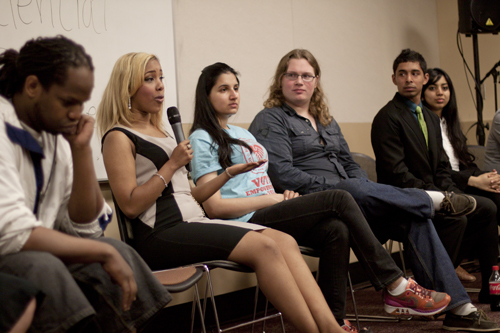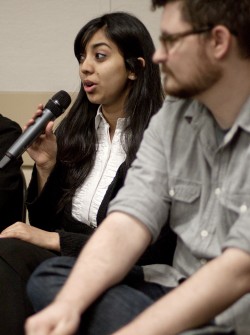Tensions rose during Thursday’s Associated Students of Portland State University presidential debate, where both presidential and vice presidential candidates bantered back and forth over their qualifications and readiness to hold the executive office.
Barbs thrown at ASPSU presidential debate
Tensions rose during Thursday’s Associated Students of Portland State University presidential debate, where both presidential and vice presidential candidates bantered back and forth over their qualifications and readiness to hold the executive office.

Present on the panel of candidates were Tiffany Dollar and running mate Marlon Holmes; Diamond Zerework and running mate Anam Pasha;Victor Mena and running mate Mona Syeda; Ethan Allen Smith and Hamilton Forest Alexander.
The first half was fairly tame in terms of the candidates’ rhetoric. Sen. Tyson Jones noted some of the highlights of the first half: “They talked about how to build relationships with other associations and organizations. They talked about how each person would best represent the PSU student body and how they are qualified to do that,” he said.
Following the break between sessions, the major topics of discussion switched to ASPSU’s public image, the newly proposed Constitution as well as each candidate’s experience in student government and public policy.

The new Constitution initially came under attack by presidential candidate Smith, who said that the purpose of ASPSU is to “govern students and teach students how to govern.” He continued by explaining that the proposed Constitution is perhaps counterproductive to the idea of student government. “The [proposed Constitution] changes ASPSU so that it reflects more closely a parliamentary system. We can appreciate the boldness of that, but the system is different than the U.S. state or national level system. That defeats the purpose of student government,” Smith said. “That is the first problem I have with it. The executive branch has a voice in every single meeting, defeating the purpose of the student senate. I fundamentally oppose the new Constitution,” he added.
Presidential candidate Zerework also stated her own issues with the constitutional amendments. “My problem with the proposal is that the SFC chair is appointed. This is not democratic. I preach and practice democracy. You cannot convince the PSU body or me that less representation is more,” she said.
However, some candidates championed the new Constitution.
“While the proposal does have some limitations, we recognize the benefits. The thing about the VARC proposal that I really like is the restructuring of the representing constituencies in the student senate,” Dollar said. “This basically puts ASPSU in the position of a liaison between students and student government.”
Dollar’s VP candidate Holmes made clear his point of ASPSU’s role in regard to the PSU student body. “As far as governing students, we don’t govern anybody. We are an advocacy group,” he said.
Mena agreed with Holmes. “This is student government, we are here to develop leadership skills not govern students,” he said.
Alexander also supports the new Constitution. “I am really a proponent of the smaller group of senators because senators will be further encouraged to be present at meetings and work together,” he said.
Things got heated when the debate moderator opened up the discussion to questions from the audience. Sen. Bearnard Kenyon publicly and somewhat aggressively questioned Zerework’s commitment to student government. He made accusations of Zerework’s alleged absence at senate meetings and lack of punctuality. “How are you going to step it up in terms of your attendance? Check the records,” Kenyon said.
Zerework fired back by denying the accusations. “None of those accusations are true. I have no problem taking the heat and being held accountable for all of my choices,” she said. “I am here to work on behalf of you, the students.”
This question prompted Smith to bring up the conflicts within ASPSU and his thoughts on the matter. “That kind of unethical behavior would not be acceptable in my administration,” he said with regard to Kenyon’s outburst. “I find such objections and bad behavior disheartening.”
While most of the candidates agreed on changing the perceived negative manner in which ASPSU legislators operate, Holmes made the point that intense debate is the nature of politics and governance. “You have to agree to disagree. It’s not going to be all roses and Mary Poppins; you’re going to have squabbles,” he said.
“I want everyone to work on things that reflect well on ASPSU, PSU and their own career. The job is about working on real projects and providing real benefits,” Alexander said.
The debate attracted a broad spectrum of viewers including ASPSU members and PSU students interested in seeing who could possibly be in their future administration. The entire event was broadcast through microphones via the university radio station, KPSU.
Voting is open until May 21. Students can vote on the ASPSU website: aspsu.pdx.edu







Nice job making Ethan Allen Smith and Diamond Zerework look sympathetic. Your bias is showing again Vanguard.
I have to echo Phil on that comment. It seems to me that Zerework and Smith are the Vanguard favorites here, both of whom do not have clear goals of what they would do in office. Zerework as is well known, is only doing this for her resume so it looks good on her law school application and has been slinging lies the entire time. The SFC chair is NOT appointed, rather all SFC members are elected during the general elections, and then the chair is elected by the student fee committee and approved by the senate. Also, the VARC committee was not just comprised of directors, three senators were voted in by the senate, of which Zerework voted as well, which is yet another lie she made during the debates. In regards to Zerework’s attendance, Zerework was routinely late to senate meetings, didn’t even show up at times, and constantly abstained. As the senator of publications, Zerework’s abstentions meant that publications (in particular the Vanguard) had no voice or say in decisions, especially when the VARC Proposal was being voted on and discussed, in which Zerework constantly abstained because she was too busy on her computer and not paying attention. Zerework is extremely unprofessional and a loose-cannon, and I would not want someone like that being a representative of the university. Even Smith would make a better president, he at least has the experience and although I strongly oppose his stance on the ASPSU leadership award, Smith would at least listen to others and not act impulsively. As for Victor and Tiffany, I think both would be excellent presidents, and I really hope one of them wins because that will ensure ASPSU will be governed by people with experience and a passion for social justice. If Zerework wins, prepare for ASPSU to be run into the ground.